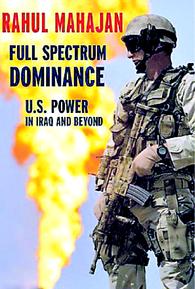The basic contention of the book is that the Bush Administration's war on terror isn't really a war on terror at all. Mahajan firmly believes that U.S. attacks on Afghanistan and Iraq have made Americans less safe, not more so. He claims that military analysts have understood for decades that it's our military belligerence that pisses off terrorist groups in the first place.
Every time we drop a bomb on Muslim countries—which, let's face it, has replaced baseball as our official national pastime—we make it easier for Al Qaeda scum to recruit gullible young men to their cause. Of course, right-wing morons call this argument “blaming the victim,” but that doesn't escape the fact that Dubya's warmongering over the last couple years makes it more likely than ever that innocent Americans are going to die in large numbers. Our leaders know this, and, as Mahajan has extensively documented, they've said they believe this in public.
So, if we're not fighting all these wars to get rid of terrorism, what the hell are we fighting them for? Well, Mahajan believes that we've fought these wars for three reasons. First off, we want to get rid of dictators who were once our friends and are now embarrassments. Second, we want to spread U.S. military bases around the globe. Third, we want control over important natural resources—namely, oil.
What this boils down to—and neoconservatives have been very open about this—is that the Bush Administration seeks absolute global military and economic hegemony. In other words, yes, Bush has imperialistic intentions. That's why he has gone to such lengths to undermine treaties and international institutions. He simply doesn't care what the rest of the world thinks.
Mahajan is a longtime antiwar activist who serves on the national board of Peace Action. He's also a founding member of the Nowar Collective (www.nowarcollective.com).
His book focuses mainly on Iraq because Mahajan believes that our actions toward that country best exemplify the evolving neoconservative doctrines that have come to dominate American foreign policy. This isn't a long book, but it contains a very useful historical chronology of our relationship with Iraq from the early '80s to the present.
The book is notable for its concise explanation of this latest phase of American imperialism. Although the Bush Administration didn't cause 9/11, Mahajan provides ample evidence to indicate that it has used that tragedy to attempt to achieve goals that have absolutely nothing to do with the security of the American people.









